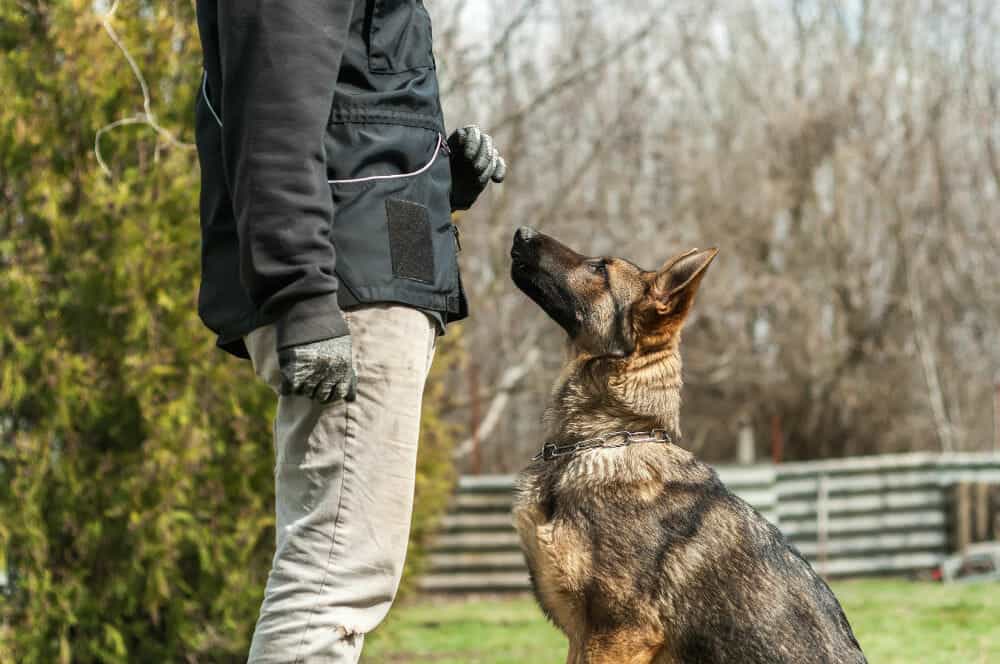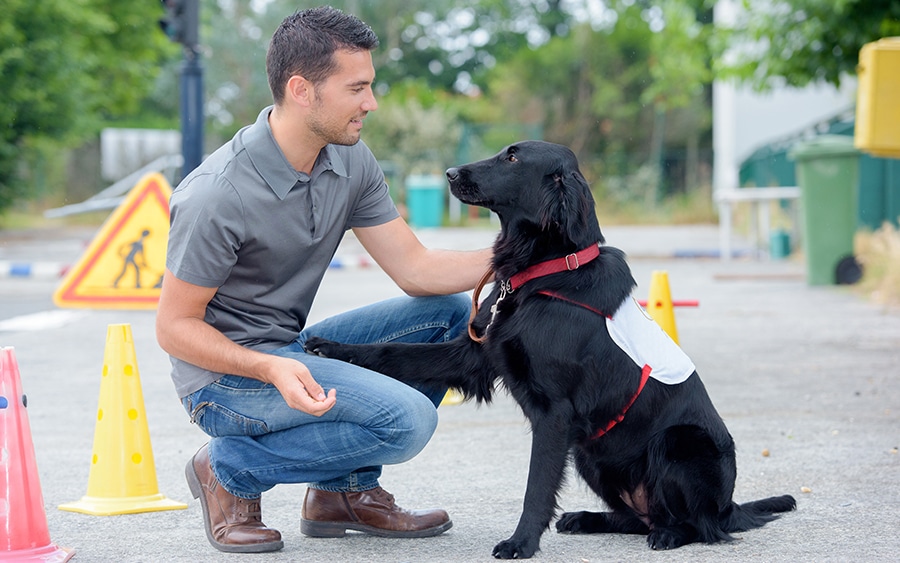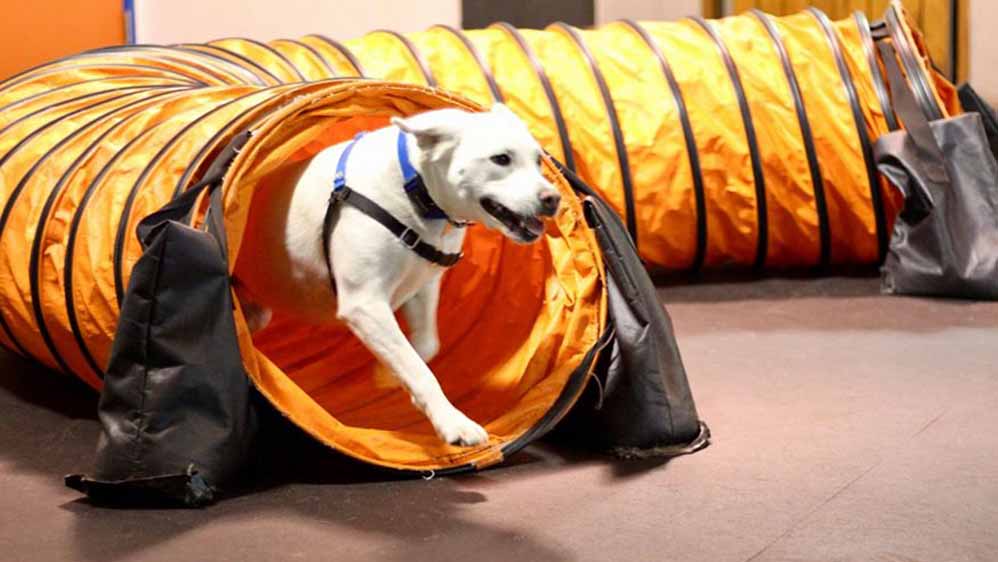Unlock Your Pet's Possible: Proven Pet Training Techniques for Success
Effective pet dog training is a nuanced process that depends upon understanding canine behavior and utilizing scientifically backed methods. Dog training. By including favorable support, developing clear commands, and prioritizing socialization, pet proprietors can cultivate an effective relationship with their pets. Challenges typically emerge that call for customized remedies and an individual strategy. Discovering these shown techniques discloses not only the potential for behavioral enhancement but likewise the much deeper bond that can be created in between proprietor and pet. What important strategies must be thought about to genuinely open your dog's possibility?
Understanding Dog Actions
Understanding dog actions is vital for efficient training and fostering a positive relationship between pet dogs and their owners. A thorough understanding of canine body movement, articulations, and social communications is vital for recognizing their feelings and requirements. Canines interact mostly via non-verbal hints; as an example, a wagging tail may show enjoyment, while pinned ears can signal anxiety or entry.

Moreover, environmental factors play a significant role in shaping a dog's behavior. Adjustments in regular, brand-new environments, or the existence of unknown individuals can lead to stress or anxiety in pets. Identifying these triggers enables proprietors to alleviate negative reactions and develop ideal training approaches.
Eventually, a deep understanding of canine behavior lays the structure for effective training techniques, improving both actions and the general bond between the pet and its owner. dog training near me. This knowledge is indispensable for cultivating a well-adjusted, delighted canine companion
Favorable Reinforcement Strategies
Reliable training relies greatly on positive support methods, which have been revealed to yield substantial lead to forming preferred behaviors in pet dogs. This method involves awarding a canine for showing particular actions, consequently increasing the chance that these behaviors will certainly be duplicated. Benefits can take various types, consisting of treats, appreciation, toys, or play, depending on what encourages the individual pet dog.

It is vital to slowly phase out rewards as the pet finds out the habits, transitioning to intermittent support. This approach keeps the actions gradually while stopping dependency on consistent benefits. By concentrating on favorable reinforcement, trainers can grow a trusting partnership with their pet dogs, promoting a cooperative and healthy and balanced training environment that boosts general obedience and performance.
Developing Consistent Commands
A basic element of effective pet dog training is the establishment of constant commands. Consistency in commands is critical for reliable communication in between the pet dog and the fitness instructor. When commands are consistent, pet dogs learn to connect particular words with wanted habits, which increases the training process and boosts understanding.
To establish regular commands, it is vital that all member of the family make use of the same terms and gestures. For instance, if one individual utilizes "rest" while another states "take a seat," it can create confusion for the pet dog. Select clear, distinct words for commands and make sure every person involved in the canine's training follows these selections.
Additionally, repeating is vital. Reinforce commands through regular method, ensuring that the dog gets adequate possibilities to react properly. When a dog effectively adheres to a command, immediate positive support must comply with. This can be in the kind of treats, appreciation, or playtime, solidifying the connection between the command and the activity.
Finally, hold your horses. Establishing consistent commands takes time and effort. With dedication and quality, you will certainly assist your canine establish a strong understanding of assumptions, inevitably bring about a mannerly buddy.
Socialization and Exposure
Mingling a pet is essential for cultivating a well-adjusted and certain companion. This procedure entails subjecting your dog to a selection of settings, people, and various other pets to develop their social abilities and flexibility. Early socialization, preferably in between the ages of three to fourteen weeks, is crucial, as it lays the foundation for a pet dog's future behavior.
Throughout socialization, aim to give positive experiences in various setups, such as parks, busy roads, and homes with other pets. Present your dog to numerous stimuli, consisting of noises, sights, and scents, guaranteeing that each experience is satisfying. This exposure assists mitigate anxiety and stress and anxiety, leading the way for a much more resilient pet dog.
Involving in regulated group play sessions with other pet dogs can additionally enhance social skills, showing your pet proper communications and boundaries. Focusing on socialization will considerably contribute to your pet dog's total joy and behavior throughout their life.
Overcoming Common Training Challenges

One more frequent problem is distraction. Pet dogs may battle to focus in active or unfamiliar setups. Progressively desensitize your pet dog to interruptions by beginning training in a quiet setting and slowly introducing even more stimuli as they end up being competent (dog training charlotte). Positive support techniques, such as treats and appreciation, can maintain motivation and emphasis.
Furthermore, behavior concerns like jumping or excessive barking can end up being irritating. Address these by instructing different behaviors, such as sitting comfortably when welcoming guests. Uniformity and persistence are essential; strengthen desired habits constantly and prevent abuse, which can bring about complication.
Last but not least, recognize that each dog is distinct, and training timelines may vary. Tailor your technique to your pet dog's specific demands, and seek professional guidance if necessary. With determination and the ideal methods, getting over these obstacles can lead to a trained, satisfied canine friend.
Conclusion
Finally, unlocking a pet dog's prospective requires a detailed Our site technique that includes an understanding of canine habits, the application of favorable support techniques, and the establishment of consistent commands. Early socialization and direct exposure to varied settings additionally improve a pet dog's versatility and confidence. By dealing with common training challenges with tailored techniques and patience, a harmonious and cooperative relationship between pet and trainer can be cultivated, inevitably leading to a well-behaved friend efficient in flourishing in various situations.
Reliable pet training is a nuanced procedure that hinges on understanding canine behavior and utilizing clinically backed strategies.Comprehending pet dog actions is this page crucial for reliable training and cultivating a favorable connection in between dogs and their proprietors.Efficient training depends heavily on favorable reinforcement methods, which have been shown to generate considerable outcomes in shaping wanted habits in pets. When commands are uniform, pets learn to connect specific words with preferred actions, which speeds up the training procedure and improves understanding.
In verdict, unlocking a pet's prospective demands a detailed strategy that incorporates an understanding of canine actions, the application of positive support strategies, and the establishment of constant commands.